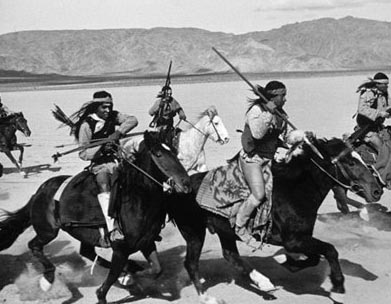
The film's attitudes toward Native Americans are unenlightened. The Apaches are seen simply as murderous savages; there is no suggestion the white men have invaded their land. Ford shared that simple view with countless other makers of Westerns, and if it was crude in 1939 it was even more so as late as "The Searchers" (1956), the greatest Ford/Wayne collaboration.
Roger Ebert
The movie opens with a scene of the cavalry riding and the light music of "I Dream of Jeannie with the Light Brown Hair" playing, but when the Indians move across the screen we hear a much more menacing and unsettling tune.
We then open with a scene in a tent where we hear that:
"There hills here are full of Apaches. They've burned every ranch building in sight. He had a brush with them last night. Says their being stirred up by Geronimo.
"Geronimo? How do we know he isn't lyin?"
"No, he's a Cheyenne. They hate Apaches worst then we do."
"Clear the wire to Lordsburg"
"That's Lordsburg now sir. They seem to have something very urgent to tell you sir."
"Well, what's wrong?"
"The line went dead sir"
"What have you got there?"
"Only the first word sir"
"Geronimo"
Then the ominous and scary music is played.
Stagecoach is a movie about a collection of different people taking a stagecoach to Lordsburg, all for different reasons. Dallas is a prostitute who has been kicked out of town by a group of ladies wearing ribbons and a lawman. The drunken Doc Boone is being kicked out of his place for not paying the rent. An embezzling banker, a liquor salesman, a former Confederate officer, Hatfield, and the wife of a Calvary officer are all thrown together in a rather uncomfortable social setting in the stagecoach. They are soon joined by the Ringo Kid who is heading to Lordsburg to avenge the killing of his father and brother by the Plummer boys. They are driven on the journey by Curley and Buck.
A Calvary officer tells one of the driver about Geronimo. Buck warns the passengers but they all agree to go on. the stagecoach moves peacefully through Monument Valley. When they get to the transfer station the escorting troops have to leave the stagecoach. After some debate the stagecoach decides to go on alone.
At the next station, Apache Wells, the troops have also left. When they see smoke in the hills they know they are in trouble. They head out quick for a ferry crossing but when they get there the ferry has been burned out. They manage to get across the river and think they have made it to safety. But then we see Geronimo and the Apaches up on the hill. They don't say anything but one of them points at the stage. As the people in the stagecoach drink a toast, thinking they have made it to safety, an arrow enters and hits the liquor salesman in the chest.
The iconic attack on the stagecoach then begins. There is some great horsemanship and stunt riding as the Apaches attack the stagecoach. Buck, Curley, Hatfield, Doc and Ringo all shoot down the attacking Apaches. I counted sixteen falling. When the men in the stagecoach run out of ammunition Hatfield is about to use his last bullet on the officer's wife, to save her from capture by the Apaches, but gets shot before he can pull the trigger. Then cavalry shows up and the Apaches ride off.
A great movie, but is it racist. I don't think so. We never do get the Apaches point of view, but I think we can assume that they were attacking the stage because it was going through their land and they were at war to try to drive the whites out.
This was not a movie that was sympathetic to the Indians. They were used as a plot device to help drive the movie, and John Ford used them very effectively as he did in Drums Along the Mohawk, made in the same year.
I think we should give John Ford a pass on his treatment of Indians in this movie, he had his target on other things. He explored the relationships between people from different backgrounds and different social classes. He made a very liberal and sympathetic statement about how social conditions can drive people to do things that they may regret doing. When Curley let Dallas and Ringo ride off in the end to start a new life in Mexico, Ford made a very strong statement that we shouldn't judge others for what they have done, because we don't know what they have gone through to get there.
When people think of Stagecoach they think of the Apaches chasing the stage. I think they should be thinking more about the statement that John Ford made about not judging our fellow human beings. Not a great movie about Indians, but still a great movie.
|